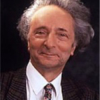Theodore Zeldin

Theodore Zeldin
Theodore Zeldinis an Oxford scholar and thinker whose books have searched for answers to three questions. Where can a person look to find more inspiring ways of spending each day and each year? What ambitions remain unexplored, beyond happiness, prosperity, faith, love, technology or therapy? What role could there be for individuals with independent minds, or who feel isolated or different, or misfits? Each of Zeldin’s books illuminates from a different angle what people can do today that they...
NationalityEnglish
ProfessionPhilosopher
Date of Birth22 August 1933